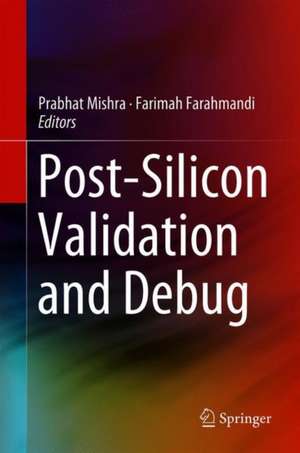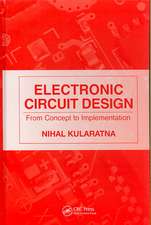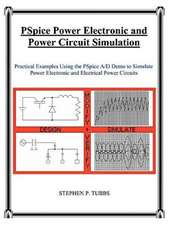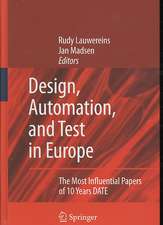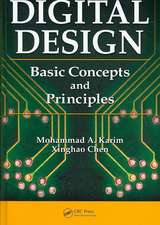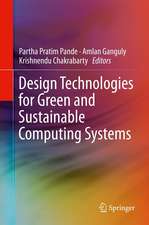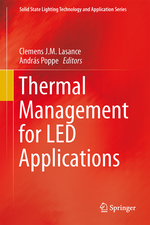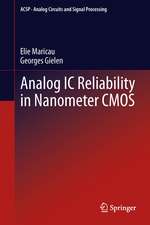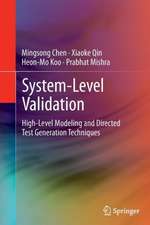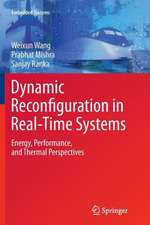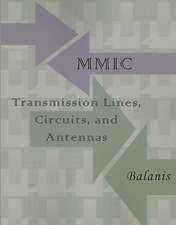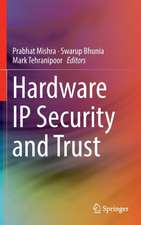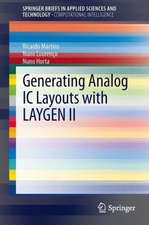Post-Silicon Validation and Debug
Editat de Prabhat Mishra, Farimah Farahmandien Limba Engleză Hardback – 13 sep 2018
| Toate formatele și edițiile | Preț | Express |
|---|---|---|
| Paperback (1) | 584.31 lei 38-44 zile | |
| Springer International Publishing – 14 dec 2018 | 584.31 lei 38-44 zile | |
| Hardback (1) | 956.18 lei 6-8 săpt. | |
| Springer International Publishing – 13 sep 2018 | 956.18 lei 6-8 săpt. |
Preț: 956.18 lei
Preț vechi: 1166.08 lei
-18% Nou
Puncte Express: 1434
Preț estimativ în valută:
183.02€ • 198.87$ • 153.84£
183.02€ • 198.87$ • 153.84£
Carte tipărită la comandă
Livrare economică 21 aprilie-05 mai
Preluare comenzi: 021 569.72.76
Specificații
ISBN-13: 9783319981154
ISBN-10: 3319981153
Pagini: 389
Ilustrații: XV, 394 p. 189 illus., 113 illus. in color.
Dimensiuni: 155 x 235 x 31 mm
Greutate: 0.75 kg
Ediția:1st ed. 2019
Editura: Springer International Publishing
Colecția Springer
Locul publicării:Cham, Switzerland
ISBN-10: 3319981153
Pagini: 389
Ilustrații: XV, 394 p. 189 illus., 113 illus. in color.
Dimensiuni: 155 x 235 x 31 mm
Greutate: 0.75 kg
Ediția:1st ed. 2019
Editura: Springer International Publishing
Colecția Springer
Locul publicării:Cham, Switzerland
Cuprins
Part 1. Introduction.- Post-Silicon SoC Validation Challenges.- Part 2. Debug Infrastructure.- SoC Instrumentations: Pre-silicon Preparation for Post-silicon Readiness.- Structure-based Signal Selection for Post-silicon Validation.- Simulation-based Signal Selection.- Hybrid Signal Selection.- Post-Silicon Signal Selection using Machine Learning.- Part 3. Generation of Tests and Assertions.- Observability-aware Post-Silicon Test Generation.- On-chip Constrained-Random Stimuli Generation.- Test Generation and Lightweight Checking for Multi-core Memory Consistency.- Selection of Post-Silicon Hardware Assertions.- Part 4. Post-Silicon Debug.- Debug Data Reduction Techniques.- High-level Debugging of Post-silicon Failures.- Post-silicon Fault Localization with Satisfiability Solvers.- Coverage Evaluation and Analysis of Post-silicon Tests with Virtual Prototypes.- Utilization of Debug Infrastructure for Post-Silicon Coverage Analysis.- Part 5. Case Studies.- Network-on-Chip Validation and Debug.- Post-silicon Validation of the IBM Power8 Processor.- Part 6. Conclusion and Future Directions.- SoC Security versus Post-Silicon Debug Conflict.- The Future of Post-Silicon Debug.
Notă biografică
Prabhat Mishra is a Professor in the Department of Computer and Information Science and Engineering at the University of Florida. His research interests include embedded and cyber-physical systems, energy-aware computing, hardware security and trust, system-on-chip verification, bioinformatics, and post-silicon validation and debug. He received his Ph.D. in Computer Science and Engineering from the University of California, Irvine. He has published six books and more than 150 research articles in premier international journals and conferences. His research has been recognized by several awards including the NSF CAREER Award, IBM Faculty Award, three best paper awards, and EDAA Outstanding Dissertation Award. Prof. Mishra currently serves as the Deputy Editor-in-Chief of IET Computers & Digital Techniques, and as an Associate Editor of ACM Transactions on Design Automation of Electronic Systems, IEEE Transactions on VLSI Systems, and Journal of Electronic Testing. Currently, he is serving as the Program Chair of International Conference on VLSI Design and International Conference on Embedded Systems. He has served on many conference organizing committees and technical program committees of premier ACM and IEEE conferences. He is currently serving as an ACM Distinguished Speaker. Prof. Mishra is an ACM Distinguished Scientist and a Senior Member of IEEE.
Farimah Farahmandi received her Ph.D. from the Department of Computer and Information Science and Engineering at the University of Florida, 2018. She received her B.S. and M.S. from the Department of Electrical and Computer Engineering at the University of Tehran, Iran in 2010 and 2013, respectively. Her research is focused on developing analytical models and computational methods for design and verification of secure, trustworthy and energy-efficient systems. During her Ph.D., she has actively collaborated with various research groups (IBM, NXP, Intel, and Cisco) that have led to several joint publications. Her research has resulted in one book, six book chapters, and thirteen publications in premier ACM/IEEE journals and conferences. Her research has been recognized by several awards including IEEE System Validation and Debug Technology Committee Student Research Award, Gartner Group Info-Tech Scholarship, nomination for Best Paper Award in ASPDAC 2017, DAC Richard Newton Young Student Fellowship, and SIGDA Ph.D. Forum at DAC. She was a research intern in advanced security research group at Cisco in summer 2016.
Farimah Farahmandi received her Ph.D. from the Department of Computer and Information Science and Engineering at the University of Florida, 2018. She received her B.S. and M.S. from the Department of Electrical and Computer Engineering at the University of Tehran, Iran in 2010 and 2013, respectively. Her research is focused on developing analytical models and computational methods for design and verification of secure, trustworthy and energy-efficient systems. During her Ph.D., she has actively collaborated with various research groups (IBM, NXP, Intel, and Cisco) that have led to several joint publications. Her research has resulted in one book, six book chapters, and thirteen publications in premier ACM/IEEE journals and conferences. Her research has been recognized by several awards including IEEE System Validation and Debug Technology Committee Student Research Award, Gartner Group Info-Tech Scholarship, nomination for Best Paper Award in ASPDAC 2017, DAC Richard Newton Young Student Fellowship, and SIGDA Ph.D. Forum at DAC. She was a research intern in advanced security research group at Cisco in summer 2016.
Textul de pe ultima copertă
This book provides a comprehensive coverage of System-on-Chip (SoC) post-silicon validation and debug challenges and state-of-the-art solutions with contributions from SoC designers, academic researchers as well as SoC verification experts. The readers will get a clear understanding of the existing debug infrastructure and how they can be effectively utilized to verify and debug SoCs.
- Provides a comprehensive overview of the SoC post-silicon validation and debug challenges;
- Covers state-of-the-art techniques for developing on-chip debug infrastructure;
- Describes automated techniques for generating post-silicon tests and assertions to enable effective post-silicon debug and coverage analysis;
- Covers scalable post-silicon validation and bug localization using a combination of simulation-based techniques and formal methods;
- Presents case studies for post-silicon debug of industrial SoC designs.
Caracteristici
Provides a comprehensive overview of the SoC post-silicon validation and debug challenges Covers state-of-the-art techniques for developing on-chip debug infrastructure Describes automated techniques for generating post-silicon tests and assertions to enable effective post-silicon debug and coverage analysis Covers scalable post-silicon validation and bug localization using a combination of simulation-based techniques and formal methods Presents case studies for post-silicon debug of industrial SoC designs
